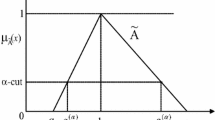Abstract
Whenever a problem to predict and ensure reliability of human-machine systems is posed, regression models are usually applied to evaluate the influence of different factors on faultlessness, exactitude, operating speed, and other characteristics of the operator performance. The Sugeno fuzzy knowledge bases are proposed to model multi-factor relations of reliability. It is shown that this approach allows to combine expert knowledge and analytical relations of the parametric reliability theory in operator activity models. The expert component of a model provides with a comprehensive interpretation, while analytical input-output relations make a model compact. Appropriate examples are presented to demonstrate advantages of the Sugeno knowledge base application to describe multi-factor reliability relations of human operator.
Similar content being viewed by others
References
Rotshtein, A.P. and Kuznetsov, P.D., Proektirovanie bezdefektnykh cheloveko-mashinnykh tekhnologii (Design of Fault-Free Human-Machine Technologies), Kiev: Tekhnika, 1992.
Kuznetsov, P.D. and Rotshtein, A.P., Analytic-Experimental Estimations of the Display Operator Faultlessness and Operating Speed, Upravl. Syst. Mash., 1984, no. 6, pp. 35–39.
Informatsionno-upravlyayushchie cheloveko-mashinnye sistemy. Issledovanie, proektirovanie, upravlenie. Spravochnik (Information-Control Human-Machine Systems. Analysis, Design, Control. Handbook), Gubinskiy, A.I. and Evgrafov, V.G., Eds., Moscow: Mashinostroenie, 1994.
Zarakovskiy, G.M. and Pavlov, V.V., Zakonomernosti funktsionirovaniya ergaticheskikh sistem (Ergatic System Functioning Laws), Moscow: Radio i Svyaz, 1987
Zarakovskiy, G.M., Korolev, B.A., Medvedev, V.I., et al., Vvedenie v ergonomiku (Introduction to Ergonomics), Zinchenko, V.P., Ed., Moscow: Sovetskoe Radio, 1974.
Munipov, V.M. and Zinchenko, V.P., Ergonomika (Ergonomics), Moscow: Logos, 2001.
Osnovy inzhenernoi psikhologii. Uchebnik dlya tekhnicheskikh vuzov (Fundamentals of Engineering Psychology. Textbook for Students in Engineering), Dushkov, B.A., Lomov, B.F., and Rubakhin, V.F., Eds. Moscow: Vysshaya Shkola, 1986.
Venda, V.F., Inzhenernaya psikhologiya i sintez sistem otobrazheniya informatsii (Engineering Psychology and the Information Display System Design), Moscow: Mashinostroenie, 1982.
Bodrov, V.A. and Orlov, V.Ya., Psikhologiya i nadezhnost’. Chelovek v sistemakh upravleniya tekhnikoi (Psychology and Reliability. Human Being in Engineering Control Systems), Moscow: Inst. Psikhol., 1998.
Zadeh, L., Outline of a New Approach to the Analysis of Complex Systems and Decision Processes, IEEE Trans. Syst., Man, Cybernet., 1973, vol. 3, no. 1, pp. 28–45.
Rotshtein, A.P., Intellektual’nyae tekhnologii identifikatsii: nechetkaya logika, geneticheskie algoritmy, neironnye seti (Intellectual Identification Technologies: Fuzzy Logic, Genetic Algorithms, Neural Networks), Vinnitsa: UNIVERSUM, 1999.
Takagi, T. and Sugeno, M., Fuzzy Identification of Systems and Its Applications to Modeling and Control, IEEE Trans. Syst., Man., Cybernet., 1985, vol. 15, no. 1, pp. 116–132.
Jang, J.-S.R., ANFIS: Adaptive-Network-Based Fuzzy Inference System, IEEE Trans. Syst. Cybernet., 1993, vol. 23, pp. 665–685.
Proektnaya otsenka kachestva vypolneniya funktsii ASU GPS s uchetom deistvii operatorov APM: metodicheskie rekomendatsii (Project Quality Evaluation for ASU GPS Functioning with Account of ARM Operator Actions: Methodical Recommendations), Moscow: VNIITEMR, 1989.
Author information
Authors and Affiliations
Additional information
Original Russian Text © A.P. Rotshtein, S.D. Shtovba, 2009, published in Avtomatika i Telemekhanika, 2009, No. 1, pp. 180–187.
Rights and permissions
About this article
Cite this article
Rotshtein, A.P., Shtovba, S.D. Modeling of the human operator reliability with the aid of the Sugeno fuzzy knowledge base. Autom Remote Control 70, 163–169 (2009). https://doi.org/10.1134/S0005117909010123
Received:
Published:
Issue Date:
DOI: https://doi.org/10.1134/S0005117909010123




